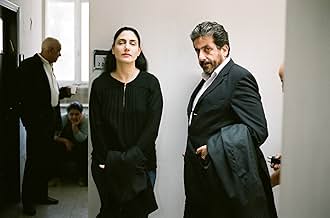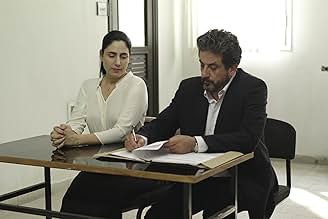Après plus de vingt ans d'un mariage sans amour, une femme fait appel à la compassion de son mari pour obtenir l'acte de divorce tant désiré devant un tribunal, ce qui se révèle plus diffici... Tout lireAprès plus de vingt ans d'un mariage sans amour, une femme fait appel à la compassion de son mari pour obtenir l'acte de divorce tant désiré devant un tribunal, ce qui se révèle plus difficile qu'elle pourrait s'y attendre.Après plus de vingt ans d'un mariage sans amour, une femme fait appel à la compassion de son mari pour obtenir l'acte de divorce tant désiré devant un tribunal, ce qui se révèle plus difficile qu'elle pourrait s'y attendre.
- Réalisation
- Scénario
- Casting principal
- Récompenses
- 15 victoires et 19 nominations au total
- Rabbi Shimon
- (as Sasson Gabai)
- Head Rabbi Salmion
- (as Eli Gornstein)
- Rabbi Abraham
- (as Roberto Pollak)
- Rachel Amzalleg
- (as Rubi Porat Shoval)
Avis à la une
Without a Get, neither spouse can remarry. If the man abandons his wife and leaves the country, the woman is in a legal limbo. This was the subject of an earlier short Israeli film, Ha-Get. In Gett, the man is available but refuses to consent. The Rabbis try all the limited avenues available to force consent (take away the driver's license, jail, etc.) but can't force the man to sign. That is the basis of Gett.
I have given Gett a 9 despite the lack of action and the focus on a less than universal problem. My reason is that, while watching Gett, I found similarities to the classic 12 Angry Men. I realize that it's a different courtroom and type of case on trial but that static tension is present in both films. The second reason is the acting skills displayed, particularly by Ronit Elkabetz. Even if you knew nothing about the divorce problem in Israel, you can read in Ronit Elkabetz' character the agony and frustration that getting a Get can cause.
I highly recommend Gett.
This is the final piece to the creative siblings' trilogy on Israeli marriage that began with To Take a Wife (2004), and was followed by 7 Days (2008). That's right, the two characters of husband Elisha (Simon Ebkarian) and wife Viviane (played by director Ronit Elkabetz who was also in the excellent 2007 film The Band's Visit) have been followed through the stages of marriage, separation, and now divorce court. Only their divorce court is not what most of the world thinks of when we hear that term. In Israel, divorce is not a civil matter, but rather falls under Jewish law and the proceedings are overseen by a triumvirate of rabbinical judges. If that's not difficult enough to stomach it's the husband who holds ALL the power. The husband must agree to grant his wife the divorce. Without his permission, the judges can do nothing and the wife is bound to the marriage.
With the story unfolding almost exclusively in the bleak courtroom, Viviane trudges through delays, no-shows, desperate negotiations, and other time-wasters; only occasionally succumbing to an outburst, rather than her usual quiet dignity. Elisha maintains a seemingly proud and determined look when he does show for hearings, only periodically shooting a look of disgust at his wife. His confidence stems from the power in knowing that grounds for divorce do not include irreconcilable differences. The camera work puts us right in the courtroom and we soon recognize Elisha's mannerisms as not just passive-aggressive, but also manipulative and misguided. He is not an awful man, but this is an awful marriage.
Long a fan of courtroom dramas, I was mesmerized by the dumbfounding process as well as the stellar performances, excellent script and POV camera work. Ms Elkabetz is terrific as Viviane, and her work is complimented by Mr Ebkarian as her husband, Sasson Gabay as his brother and advocate, and Menashe Noy as her advocate and admirer. The film is a strange blend of hypnotic and infuriating and heart-breaking. It's uncomfortable to watch, but one we can't turn away from especially as Viviane shouts "You don't see me!" to the judges.
With the exception of a minute or so, all of this film takes place in a small courtroom with occasional scenes in an adjoining waiting room. As the courtroom looks bland and ordinary, this film deliberately takes on the challenge of maintaining viewers' interest within such constraints. In doing so, it succeeds with flying colours.
This is due to a detailed script with various surprises and a superb cast especially Ronit Elkabitz in the title role. (She is also the co-director and co-writer with Shlomi Elkabitz, her brother.) She has a couple of explosive scenes that are riveting especially one in which she cathartically expresses the views of many of us in the audience.
The various accounts of the plaintiff, defendant, witnesses, and lawyers provide all the detail in what could have been a solid movie about a disintegrating marriage, Ingmar Bergman-style. Incidentally, some of the witness accounts from relatives and neighbours are the most revealing aspects of the story and of the culture of a religious community.
In the end, it is the audience who are the true witnesses and judges of a legal system that is absurd and harshly unfair to women.
Le saviez-vous
- AnecdotesRonit Elkabetz's final film before her death.
- GaffesVivian wears only one big ring on her forth finger of her left hand throughout most of the movie. Somewhere in the middle of the movie, Vivian is shown sitting at the bench in the "court" and there is also a second ring on her second finger.
- Citations
Viviane Amsalem: Why are you making me run around in circles? Why, Your Honor? Why? Why have I come in and out for years now and nothing's changed? Why? You can't force him to divorce nor to appear, and you can't this or that, and what about me? When will you see me? When I'm too exhausted to stand before you? When? If it were up to you, it could go on for 10 years. I could drop dead in front of you and all you'd see was him! But nobody is above the law. There's a God and there's justice and He'll judge you as you judge me. Mercilessly. You don't care about me!
- ConnexionsFeatured in 72nd Golden Globe Awards (2015)
Meilleurs choix
- How long is Gett?Alimenté par Alexa
Détails
Box-office
- Montant brut aux États-Unis et au Canada
- 988 150 $US
- Week-end de sortie aux États-Unis et au Canada
- 24 210 $US
- 15 févr. 2015
- Montant brut mondial
- 1 259 160 $US
- Durée1 heure 55 minutes
- Couleur
- Rapport de forme
- 1.85 : 1
Contribuer à cette page






































